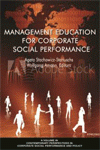
Management Education for Corporate Social Performance
Edited by:
Agata Stachowicz-Stanusch, Silesian University of Technology, Poland
Wolfgang Amann, HEC Paris
A volume in the series: Contemporary Perspectives in Corporate Social Performance and Policy. Editor(s): Agata Stachowicz-Stanusch, Canadian University Dubai.
Published 2018
The book Management Education for Corporate Social Performance is our endeavor to answer the following question: How can the academic world develop and apply a proper concept of corporate social performance to ensure more impact? The authors from different cultures, countries and educational systems present a rich diversity of insights and solutions.
The book is divided into five parts: “Introduction”, “worldwide kaleidoscope of management education for Corporate Social Performance”, “the role of management education in Corporate Social Performance”, and “using knowledge from practice and theory for responsible management education”. The book combines state-of-the-art international views, which can inspire academia as well as corporate practices.
CONTENTS
Introduction. Academic Freedom and the Social Responsibilities of Academics: A Pathway to Corporate Social Performance, Agata Stachowicz-Stanusch and Wolfgang Amman. PART I: WORLDWIDE KALEIDOSCOPE OF MANAGEMENT EDUCATION IN CORPORATE SOCIAL PERFORMANCE. Management Education for Corporate Social Responsibility in a Postcommunist Country: The Case of a Polish University Aldona Glińska-Neweś, Agata Sudolska, and Agnieszka Furmańska-Maruszak. Teaching Business Ethics at Business Schools in Transitional Cultures: An Example of Zagreb School of Economics and Management, Kristijan Krkač and Borna Jalsenjak. Multilatinas’ CSR Activities and Practices: Implications for CSR Management Education, Anabella del Rosario Dávila Martínez. PART II: THE ROLE OF MANAGEMENT EDUCATION IN CORPORATE SOCIAL PERFORMANCE. The Development of Moral Character in Business Students, Hamid H. Kazeroony and Craig D. Barton. Management Education for Millennials: Blending the Need for Financial Literacy With Socially Responsible Investment, Leslie E. Sekerka, Derek Stimel, and Doug Heske. Change Within the Existing: Introducing a New Mandatory Track on Global Challenges in a BSc-Program, Pär Mårtensson, Anna Nyberg, and Ciara Sutton. Massive Open Online Courses (MOOCs) as an Education Tool for Corporate Social Responsibility, Mirjana Pejić Bach, Mislav Ante Omazić, Ana Aleksić, and Jovana Zoroja. The Complementarities of Risk Management and CSR in Corporate Responsibility: The Way Forward for Management Education, Adela McMurray, Larry Li, and Malick Sy. PART III: USING KNOWLEDGE FROM PRACTICE AND THEORY FOR RESPONSIBLE MANAGEMENT EDUCATION. Corporate Social Responsibility: The Case of Wells Fargo Bank, Corinne Jenni and Alfred Lewis. Corporate Purpose, Authentic Stakeholder Engagement, and a Balanced Business Scorecard for Corporate Social Responsibility: A Framework to Enhance Business Education, William J. Mea, Ronald R. Sims, and Peet van Biljon. Organizational Ethics in Health Care: Proactively Caring Employees, Stefania De Simone, Andrea Tomo, and Alfonso Morvillo. The Formation of Socially Responsible Business in Ukraine, Nina Chala and Oksana Poplavskaya. Ubuntu Inside and Out: Internal Corporate Social Responsibility and External Inclusion, Jaye Goosby Smith. About the Authors.
-
Paperback978-1-64113-076-9
Web price: $45.04 (Reg. 52.99)
-
Hardcover978-1-64113-077-6
Web price: $80.74 (Reg. 94.99)
- eBook978-1-64113-078-3

- BUS085000 - BUSINESS & ECONOMICS: Organizational Behavior
- BUS035000 - BUSINESS & ECONOMICS: INTERNATIONAL: General
- BUS097000 - BUSINESS & ECONOMICS: Workplace Culture
-
 Academic Social Responsibility
Sine Qua Non for Corporate Social Performance
Academic Social Responsibility
Sine Qua Non for Corporate Social Performance
-
 Artificial Intelligence and its Impact on Business
Artificial Intelligence and its Impact on Business
-
 Contemporary Perspectives in Corporate Social Performance and Policy
The Middle Eastern Perspective
Contemporary Perspectives in Corporate Social Performance and Policy
The Middle Eastern Perspective
-
 Fostering Sustainability by Management Education
Fostering Sustainability by Management Education
-
 Mastering Anti-Corruption
The Practitioners' View
Mastering Anti-Corruption
The Practitioners' View
-
 Organizational Social Irresponsibility
Tools and Theoretical Insights
Organizational Social Irresponsibility
Tools and Theoretical Insights
-
 The Social Issue in Contemporary Society
Relations Between Companies, Public Administrations and People
The Social Issue in Contemporary Society
Relations Between Companies, Public Administrations and People

